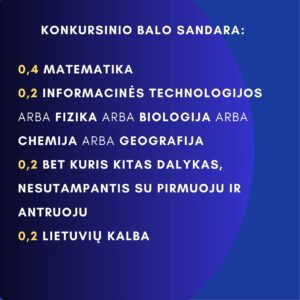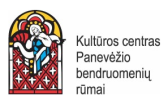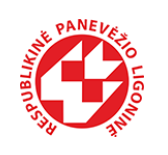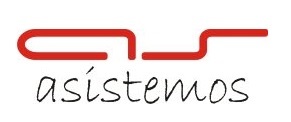Informatikos inžinerija (+tikslinės stipendijos)
 Studijų programos forma ir trukmė: nuolatinė (N) (3 metai), nuolatinė sesijinė (NS) (3 metai).
Studijų programos forma ir trukmė: nuolatinė (N) (3 metai), nuolatinė sesijinė (NS) (3 metai).
Studijų programą vykdo: Panevėžio kolegijos Technologijos mokslų fakultetas.
Kvalifikacinis laipsnis ir profesinė kvalifikacija: Informatikos mokslų profesinis bakalauras.
Studijų programos apimtis kreditais: 180 ECTS kreditų.
Kodėl verta rinktis šią programą? Studijų programa skirta tiems, kurie domisi šiuolaikinėmis kompiuterių tinklų ir serverių, debesų kompiuterijos technologijomis. Čia išmoks projektuoti ir valdyti vietinius ir globalius tinklus, diegti ir administruoti fizinius ir virtualius serverius, perkelti IT paslaugas į „debesis“, kurti darbo vietų ir tinklinę programinę įrangą. Baigę studijas galės būti tais nematomais, nežinomais tinklų administratoriais, kurie daro matomus darbus – gerina tinklų saugumą, diegia programinę serverių įrangą, ir gaudo elektroninius nusikaltėlius. Suteikiama galimybė įgyti tarptautinės CISCO kompiuterių tinklų akademijos sertifikatus.
Informacija stojantiesiems: Studentų priėmimas
Studijų kokybės vertinimo centro išvados: Peržiūrėkite čia
Ekonomikos ir inovacijų ministerija toliau tęsia tikslinių stipendijų programą studentams, įstojusiems į valstybės finansuojamas STEM (informatikos, inžinerijos, matematikos) studijų krypčių programas. Remiamų sričių būsimieji specialistai ypač reikalingi verslui, investuojančiam Lietuvoje ir kuriančiam čia darbo vietas.
Tikslinės stipendijos bus skiriamos įstojusiems į valstybės finansuojamas vietas. Kasmėnesinė 200 Eur stipendija bus mokama visą bakalauro studijų laikotarpį!


Studijuojami dalykai
| 1 kursas | 2 kursas | 3 kursas |
| Bendrieji koleginių studijų moduliai (dalykai) | ||
| Komunikacijos modulis | ||
| Studijų krypties moduliai (dalykai) | ||
| Fizika, Profesinės veiklos modeliavimas, Duomenų bazės ir informacinės sistemos, Sauga darbe, Informacinių ir komunikacijos technologijų modulis, Aukštosios matematikos modulis, Kompiuterių architektūros ir operacinių sistemų modulis, Kompiuterinė braižyba, Programavimo modulis | Programavimo modulis, Kompiuterių tinklai I modulis, Ekonomikos ir tyrimų modulis, Kompiuterių tinklai II modulis*, Elektroninių sistemų modulis, Vienas iš alternatyviai pasirenkamų modulių (dalykų): Daiktų interneto technologijos / Robotika | Elektroninių sistemų modulis, Internetinės technologijos, Serverių administravimo modulis, Programavimas mobiliesiems įrenginiams, Programų sistemų inžinerija, Informatikos teisės ir kompiuterių tinklų saugos modulis, Vienas iš alternatyviai pasirenkamų modulių (dalykų): Programuojamieji tinklai / Mobilaus ryšio tinklai |
| Kolegijos nustatyti ir pasirenkami dalykai | ||
| Du laisvai pasirenkami dalykai iš direktoriaus įsakymu patvirtinto dalykų sąrašo: PD1, PD2 | ||
| Praktikos | ||
| Technologinės praktikos modulis, Kompiuterių tinklų administravimo praktika* | Profesinės praktikos modulis, Baigiamosios praktikos modulis | |
| Baigiamojo projekto modulis | ||
*praktika įtraukta į modulio turinį
Informatikos inžinerija neatsiejama nuo šiandien ypač sparčios informacijos ir ryšio technologijų pažangos, tad ši studijų programa skirta asmenims, siekiantiems tapti informatikos inžinerijos krypties specialistais, gebančiais užtikrinti stabilų ir saugų informacijos ir komunikacijų technologijų sistemų darbą.
Dėmesys praktikai: praktikos metu studentai įtvirtina ir tobulina kompiuterių tinklo aparatinės ir programinės įrangos diegimo gebėjimus. Praktikos atliekamos kompiuterių tinklų projektavimo, diegimo bei kompiuterių tinklo sistemų administravimo ir diegimo Panevėžio miesto ir regiono įmonėse, kompiuterių tinklų laboratorijoje – CISCO akademijoje.
Tarptautinių studijų galimybės: programos studentai gali vykti studijuoti į kitas šalis pagal ERASMUS mainų programą.
Privalumas: Kolegija palaiko glaudžius ryšius su užsienio aukštosiomis mokyklomis ir užtikrina dalinių studijų bei praktikos galimybes įvairiose šalyse.
Programos tikslas: išugdyti visapusiškai išsilavinusią, etiškai atsakingą, kūrybingą ir verslią asmenybę, gebančią savarankiškai mokytis ir dirbti komandose, imantis iniciatyvos, prisiimant asmeninę atsakomybę ir konkuruoti sparčiai besikeičiančių technologijų, gaminių ir paslaugų rinkoje, taikant informatikos ir elektronikos metodus, inžinerinės veiklos principus bei technologijas saugioms kompiuterinėms sistemoms ir tinklams projektuoti, įgyvendinti, palaikyti, plėtoti, tikrinti bei vertinti, kurie gali būti naudojami įvairių sričių aktualioms profesinės veiklos problemoms spręsti.
Karjeros galimybės: įgijęs informatikos mokslų profesinio bakalauro kvalifikacinį laipsnį, absolventas gali dirbti dirbti kompiuterių tinklų ir sistemų administratoriumi, IT inžinieriu, programuotoju įvairiose įmonėse, įstaigose, organizacijose, naudojančiose kompiuterių tinklų technologijas bei kompiuterinę įrangą.
Absolventai gali siekti studijų rezultatų įskaitymo, jei nori studijuoti pagal universitetines studijų programas. Baigę papildomąsias studijas arba įvykdę kitus aukštosios mokyklos nustatytus reikalavimus turi teisę stoti į magistrantūros studijas.
Studijų programos Informatikos inžinerija studijų rezultatai:
- Paaiškinti pagrindinius faktus, sąvokas, teorijas ir matematinius metodus, susijusius su kompiuterių veikimu, kompiuterių technine ir programine įranga, jos savybėmis ir praktinio panaudojimo galimybėmis, kompiuterių komunikacija ir taikomaisiais sprendimais, kurie yra susiję su svarbiais istoriniais, dabartiniais ir galimais informatikos inžinerijos srities pokyčiais bei tendencijomis ateityje.
- Paaiškinti algoritmų sudarymo ir analizės principus, programavimo paradigmas, kalbas ir technologijas, žmogaus ir kompiuterio sąveikos principus, tipinius programinės įrangos gyvavimo ciklo etapus ir programinės įrangos kūrimo ir priežiūros metodus.
- Paaiškinti, kaip verslo, pramoninis, ekonominis ir socialinis kontekstas veikia profesinės veiklos praktiką, apibrėžiamą etikos normomis ir reglamentuojamą teisiniais reikalavimais, įskaitant duomenų apsaugą, intelektinės nuosavybės teises, sutartis, gaminių saugos, atsakomybės ir kitus susijusius klausimus.
- Taikyti informatikos inžinerijos studijų krypties žinias, kuriant saugius ir kitus aktualius kriterijus atitinkančius informatikos taikomuosius sprendimus konkrečioms profesinės veiklos problemoms spręsti.
- Paaiškinti kompiuterinės ir kitos specializuotos skaitmeninės technikos kūrimo metodus, jos sandarą ir veikimo principus, bei taikymą konkretiems uždaviniams spręsti.
- Apibūdinti studijuotos informatikos inžinerijos studijų krypties konkrečios profesinės veiklos problemą (as), paruošti, išanalizuoti ir įvertinti problemai (moms) spręsti reikalingus duomenis, informaciją iš įvairių šaltinių, sprendimus pagal konkrečius kriterijus ir pagrįsti sprendimus argumentuotomis išvadomis.
- Taikyti aktualius informatikos ir elektronikos inžinerijos metodus, formuluojant ir sprendžiant įvairių sričių taikomuosius uždavinius.
- Savarankiškai parinkti programinę ir techninę įrangą, kuriant naujas ar tobulinant esamas kompiuterių ir kompiuterių tinklų sistemas.
- Įgyvendinti specializuotą programinę įrangą kompiuterinėms ir kompiuterių tinklų sistemoms, taikant aktualius standartus, tipinius gyvavimo ciklo etapus ir projektų valdymo metodus.
- Įvertinti kompiuterines ir komunikacines sistemas pagal našumo, saugumo, patikimumo kriterijus ir tinkamai įgyvendinti kompiuterinių sistemų palaikymą ir plėtrą.
- Parengti specifikaciją, projektą ar kitą dokumentaciją, reikalingą informatikos inžinerijos srities produktui arba paslaugai sukurti.
- Profesionaliai komunikuoti valstybine ir bent viena užsienio kalba su specialistų auditorijomis, dirbti komandose, laikantis profesinio, etinio elgesio ir socialinės atsakomybės principų, planuoti ir organizuoti veiklą remiantis teisiniais ir norminiais dokumentais.
- Savarankiškai mokytis, siekiant nuolatinio asmeninio, profesinio tobulėjimo ir atsakingai dirbti, imantis iniciatyvos, prisiimant asmeninę atsakomybę, demonstruoti kūrybingumą, sprendžiant profesinės veiklos uždavinius ir problemas.































